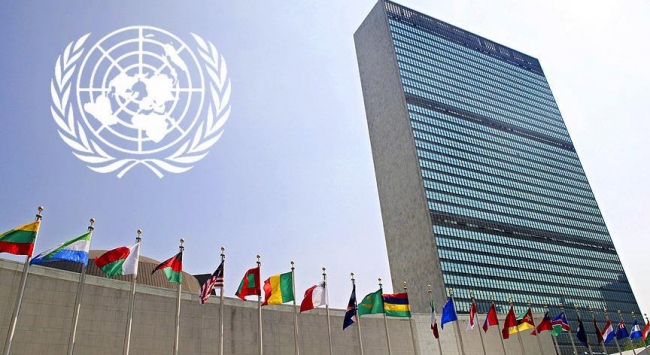Nordic Monitor
Acting Special Representative of the UN Secretary-General (SRSG) for Libya Stephanie Williams on Tuesday briefed UN Security Council (UNSC) members on the situation in Libya.
In her briefing Williams implicitly accused Turkey of violating the UN arms embargo on Libya by providing unmanned aerial vehicles (UAV) and ground air defense systems to Libya’s Government of National Accord (GNA).
“After repeated attempts, supported by multiple airstrikes conducted by drones, GNA forces took control of the [Wutiya] airbase on 18 May. The control of this strategic airbase may trigger further escalation, turning the Libyan conflict into a pure proxy war. As has been the case on a number of occasions, we witnessed the direct involvement of foreign parties in this operation, either with UAVs or the presence on the ground of air defense systems, in blatant violation of the arms embargo,” Williams stated.
A report by the UN Panel of Experts on Libya previously revealed that the Bayraktar TB2 UCAV, manufactured by Baykar Makina of Turkey, has operated out of Mitiga and Misrata since June 2019. Baykar is headed by Selçuk Bayraktar, a son-in-law of Turkish President Recep Tayyip Erdoğan.
Turkey provides military support to the GNA as well as to the allied militias that have joined forces against General Khalifa Haftar’s Libyan National Army (LNA). The Turkish government deployed troops to Libya and moved jihadists from Syria’s Idlib region to the country in line with a security accord signed in November 2019 by President Erdoğan and Fayez al-Sarraj, head of the UN-recognized GNA.
Acting SRSG Williams stressed that fighting between the LNA and GNA has escalated with an unprecedented increase in indirect fire in urban areas and a growing tide of suffering for civilians. According to the Williams, attacks by GNA UAVs resulted in civilian casualties. “Military operations in and around Tarhouna caused new displacement and negatively impacted humanitarian access to the city. I am concerned about GNA UAV attacks over the past two months on vehicles travelling between Mazdah and Tarhouna as well as in Bani Walid which caused collateral damage to vehicles carrying non-combat related items like food, goods, and fuel and resulted in civilian casualties.”

In the online briefing, Williams underlined the influx of weaponry, equipment and mercenaries to both sides in Libya and urged that the international community pressure the regional and international actors that are fueling the conflict in the North African country.
“From what we are witnessing in terms of the massive influx of weaponry, equipment and mercenaries to the two sides, the only conclusion that we can draw is that this war will intensify, broaden and deepen with devastating consequences for the Libyan people,” said Williams, adding that “[b]y coming together now, this council can ensure the collective security it is mandated to maintain by applying consistent and credible pressure on those regional and international actors that are fueling the conflict.”

Similarly, NATO Secretary-General Jens Stoltenberg stressed the escalation of violence in Libya in a readout of a phone call with Prime Minister al-Sarraj on May 16, 2020. Stoltenberg called on all parties to respect the UN arms embargo.
While Turkey backs the GNA in Libya, Haftar’s LNA has the support of the UAE, Egypt, Jordan, Saudi Arabia and Russia.
On May 4 the EU’s new Mediterranean naval and air mission, Operation IRINI, commenced its activities at sea with the French naval vessel Jean Bart and a maritime patrol aircraft contributed by Luxembourg to monitor the UN-mandated arms embargo and to stop arms shipments to the war-torn North African country.
“At the Berlin Conference, leaders agreed to work together towards a sustainable solution to the crisis in Libya. However, the conflict continues to put the lives of Libyans and the entire region at risk. The effective enforcement of the UN arms embargo on Libya will help in achieving a sustainable ceasefire and advancing towards a political agreement. Operation Irini is therefore an important contribution towards achieving this goal,” Josep Borrell, the high representative of the EU for foreign affairs and security policy, said about Operation IRINI.

Acting SRSG Williams also said the escalation, compounded by COVID-19 and the ongoing oil blockade, pose an unprecedented challenge to the socioeconomic situation of Libya. “The blockade itself has already cost Libya over 4 billion US dollars.
“As a result of the intensifying armed hostilities, coupled with the dire socio-economic impact of COVID-19 and including the loss of employment and livelihoods, a million people are now in need of some form of humanitarian assistance. This includes 400,000 internally displaced Libyans, along with 654,000 migrants, refugees and asylum seekers. In the last one year alone, since the attack on Tripoli started, 201,000 Libyans were forced to flee their homes, mostly in and around the capital,” Williams said.

According to UNSC resolution 1970 (2011) imposing an arms embargo, a travel ban and an assets freeze in connection with the situation in the Libya, “Member States shall immediately take the necessary measures to prevent the direct or indirect supply, sale or transfer to the Libyan Arab Jamahiriya, from or through their territories or by their nationals, or using their flag vessels or aircraft, of arms and related materiel of all types, including weapons and ammunition, military vehicles and equipment, paramilitary equipment, and spare parts for the aforementioned, and technical assistance, training, financial or other assistance, related to military activities or the provision, maintenance or use of any arms and related materiel, including the provision of armed mercenary personnel whether or not originating in their territories.”












